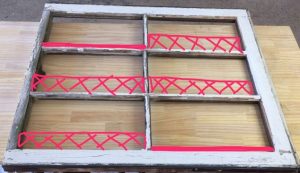Recently, a woman calling herself Alicia W shared an online video she created about a great idea she had to make use of her old windows. The video was posted on the Facebook page of Hometalk, a leading online portal for home and garden DIY.
The video has gone on to garner 405K Facebook views since it was first published.

This Hometalk’s user’s video about old windows got 405K views on Facebook. Courtesy
The high numbers don’t stop there. Having your video on the Hometalk website means taking advantage of the site’s 16 million visitors, 46 million visits, and 415 million page views. As Alicia did, you can also include a step-by-step tutorial about your project.
Hometalk is to the online home improvement DIY community what Uber is to transportation and Airbnb is to hospitality. The Internet has made it possible for anyone to be what they want to be —a driver, a property manager, or a writer — without necessarily having specific qualifications or necessary education in the field. So, too, with Hometalk, the average person can become a home improvement/DIY expert and show others what they know. Likewise, if you want to do something around your house, you can figure out how to do it by learning from people that are part of Hometalk’s general online community, while also getting their feedback and support.
SEE ALSO: The Next Wix? DIY Startup AppsVillage Helps Businesses Create Their Own Apps Instantly
But Hometalk didn’t start off as the go-to destination for home design and improvement. It actually began as a side project of Networx, a successful lead-generation marketplace connecting homeowners and contractors. Networx founders Yaron Ben-Shaul, Miriam Illions, and Celeste Kumelos realized the market was missing accessible online information that would allow people to do home projects on their own, rather than hire a contractor. What began as a method for engagement, where contractors could offer projects, tips and suggestions spun into an independent user-generated platform as the founders saw that it wasn’t the contractors that were sharing the content, but the general community.
In August 2017, Forbes reported that Hometalk had more than 100,000 user-generated DIY tutorials. It’s safe to say they are on to something.
What we are most proud of is the network and community we have organically created,” Hometalk CEO Daniel Eskapa tells NoCamels, “On Hometalk, people empower, enable, and help each other create the home they love with DIY. Our platform facilitates peer to peer partnerships that begin online and extend into the real world. Homeowners and renters can access quality information from highly experienced community members and act on this knowledge to make smarter, more resourceful home improvement choices and purchases.”
The bootstrap DIY site that makes money
For a bootstrapped startup that has not raised a single penny since inception, Hometalk is growing by leaps and bounds. The Israeli-founded company, with headquarters in Jerusalem and an office in New York, was named as the #1 fastest growing company in tech, by readers of The Next Web in 2016.

This DIY Hometalk user makes a Christmas tree ornament out of coffee filters. Courtesy
Still, while it has certainly earned its title as one of the top online platforms for people improving their homes, the company hasn’t focused on revenue, instead opting to present its users with a platform that creates value. The company does have revenue streams, however, which mainly stem from programmatic advertising. Estimated revenue for 2017 is expected to be in the $15-$20 million range. There is also talk of offering e-learning, materials, and in-person assistance from “experts” to help people with their DIY projects. Hometalk may even move into the e-commerce realm.
Sign up for our free weekly newsletter
SubscribeWhat competition? Evaluating the DIY ‘rivals’
A Euromonitor survey reported the value of the DIY market worldwide is projected to make as much as 40.7 billion dollars by the end of 2017. However, DIY is often seen as just a niche. But while it might sound like it delivers to merely a small, specialized area of the population, DIY is a growing phenomenon on the Internet. Pinterest, the social network allowing users to visually share interests with “pins” on “boards,” is considered the epitome of Internet DIY. In fact, the word DIY (along with tutorial, guide, and recipe) has a 42 percent higher click-through rate than other pins, according to Social Media Writing, an online resource for information about social media and marketing.
Pinterest could potentially be Hometalk’s biggest rival, if the company actually saw it as a direct competitor. Instead, Hometalk views Pinterest as more of a partner. According to the company’s Strategic Advisor Hillel Fuld, Hometalk doesn’t want to compete with Pinterest, but rather, use it as a place to share their DIY videos, just as they use the Hometalk platform itself. Moe Mernick, Hometalk’s Head of Business development told The Next Web, “We are often compared to Pinterest and asked how we are different. The answer is simple.” He says Hometalk focuses exclusively on helping improve your home and garden with step by step tutorials, which enriches the depth and scope of the content. Rather than just a source of inspiration, Hometalk is also about taking action. Advice and feedback from a supportive and knowledgeable online community helps people to complete projects.

This Hometalk user cuts a pallet in half, for an unexpected storage idea via Kalhh/Pixabay
Hometalk does rely on social interaction from social engagement platforms like Pinterest and Facebook for company growth. Celebs like George Takei and Jordin Sparks have already shared Hometalk videos on Facebook.
One usually doesn’t talk about Hometalk without making at least one comparison to the Houzz platform because both are Israeli-founded online communities for home improvement and decor. The main difference between the two companies is this — Hometalk offers tips and suggestions on how to improve your living space through do-it-yourself methods while Houzz offers design and remodeling ideas through product recommendations and an area of the site where one can connect specifically with home professionals. But as Houzz recently raised $400 million and was given a valuation of $4 billion, perhaps Hometalk could learn a little thing or two about monetization from Houzz, if they are inclined to scout further for methods of acquiring revenue.
SEE ALSO: Bringing Down The Houzz: Israeli Home Design Startup Raises $400M At $4B Valuation
Nevertheless, Hometalk is vying for Houzz’s position as the world’s leading online home design platform. Fuld calls Hometalk the “Home Depot” of the Internet and says the company is working on building its global brand and becoming a household name.
“I think at the end of the day it fills a real need for people. There’s nothing anywhere near it in terms of engagement. People are spending a lot of time on the site and it scratches an itch. When you do want to do something in your house, it’s the place where you’re going to find the bets content,” explains Fuld. “We’re living in a sharing economy, where wisdom from the crowd is becoming mainstream across many different platforms. This fits right into that.”
Photos: Courtesy, kalhh
Related posts

Rehabilitation Nation: Israeli Innovation On Road To Healing

Israeli High-Tech Sector 'Still Good' Despite Year Of War





Facebook comments